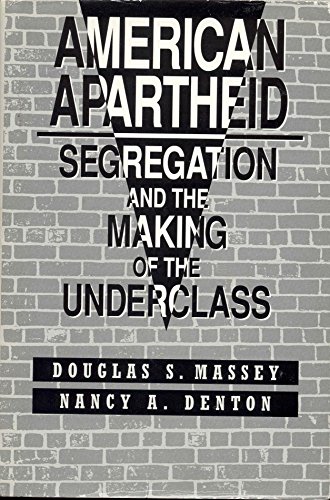Items related to American Apartheid: Segregation and the Making of the...

Synopsis
This powerful and disturbing book clearly links persistent poverty among blacks in the United States to the unparalleled degree of deliberate segregation they experience in American cities.
American Apartheid shows how the black ghetto was created by whites during the first half of the twentieth century in order to isolate growing urban black populations. It goes on to show that, despite the Fair Housing Act of 1968, segregation is perpetuated today through an interlocking set of individual actions, institutional practices, and governmental policies. In some urban areas the degree of black segregation is so intense and occurs in so many dimensions simultaneously that it amounts to "hypersegregation."
The authors demonstrate that this systematic segregation of African Americans leads inexorably to the creation of underclass communities during periods of economic downturn. Under conditions of extreme segregation, any increase in the overall rate of black poverty yields a marked increase in the geographic concentration of indigence and the deterioration of social and economic conditions in black communities. As ghetto residents adapt to this increasingly harsh environment under a climate of racial isolation, they evolve attitudes, behaviors, and practices that further marginalize their neighborhoods and undermine their chances of success in mainstream American society. This book is a sober challenge to those who argue that race is of declining significance in the United States today.
"synopsis" may belong to another edition of this title.
Review
"During the 1970s and 1980s a word disappeared from the American vocabulary," begins American Apartheid ". . . That word was segregation." But the practice of segregation certainly has not disappeared, as Douglas S. Massey and Nancy A. Denton glaringly expose. One-third of all American blacks live in one of just 16 urban areas, in neighborhoods so racially segregated they have almost no chance at interracial contact. The authors argue that segregation--and disassocation from not only other cultures, but other ways of life--is at the root of many problems facing African-Americans today.
About the Author
Douglas S. Massey is the Henry G. Bryant Professor of Sociology and Public Affairs at Princeton University and director of its Office of Population Research.
"About this title" may belong to another edition of this title.
FREE shipping within U.S.A.
Destination, rates & speedsSearch results for American Apartheid: Segregation and the Making of the...
American Apartheid : Segregation and the Making of the Underclass
Seller: Better World Books, Mishawaka, IN, U.S.A.
Condition: Very Good. Used book that is in excellent condition. May show signs of wear or have minor defects. Seller Inventory # 11572066-6
Quantity: 1 available
American Apartheid - Segregati
Seller: SecondSale, Montgomery, IL, U.S.A.
Condition: Good. Item in good condition. Textbooks may not include supplemental items i.e. CDs, access codes etc. Seller Inventory # 00093008540
Quantity: 1 available
American Apartheid: Segregation and the Making of the Underclass
Seller: HPB Inc., Dallas, TX, U.S.A.
Hardcover. Condition: Very Good. Connecting readers with great books since 1972! Used books may not include companion materials, and may have some shelf wear or limited writing. We ship orders daily and Customer Service is our top priority! Seller Inventory # S_447589158
Quantity: 1 available
American Apartheid: Segregation and the Making of the Underclass
Seller: Toscana Books, AUSTIN, TX, U.S.A.
Hardcover. Condition: new. Excellent Condition.Excels in customer satisfaction, prompt replies, and quality checks. Seller Inventory # Scanned0674018206
Quantity: 1 available

